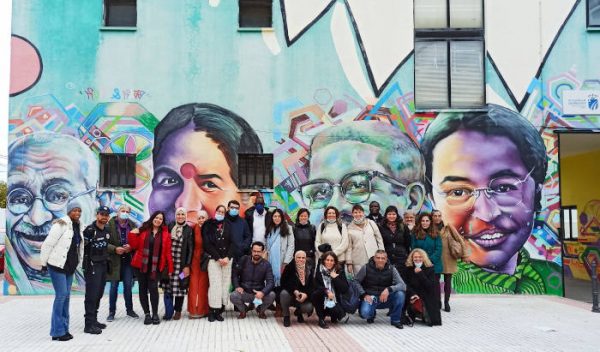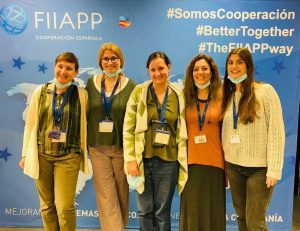-
02 November 2022
Category : Opinion
Living without discrimination in Morocco
Over the last twenty years, Morocco has gone from being a country of emigration to a country of transit and settlement of migrants. This new dimension of migratory movements confronts Moroccan society with new realities that need to be gradually integrated at the political, economic and social levels

Sara Gutiérrez Leiva is coordinator of the project “Living without discrimination: a human rights and gender-based approach“, which has worked on the protection of migrants in Morocco.
Five years of actions that are now coming to an end: What has been achieved?
A challenge for the country: the National Strategy on Immigration and Asylum
Every year, Morocco receives an increasing number of migrants, mainly from Sub-Saharan Africa. This is a challenge that requires resources to ensure the protection of migrants, with a specific focus on women.

FIIAPP team of the ‘Living without discrimination in Morocco’ project’ Despite normative advances, migrants and refugees are susceptible to racist incidents and racial discrimination. Civil society organisations, in fact, report situations of discrimination in access to housing, health services, employment or schooling for migrant children.
The truth is that racist and xenophobic incidents have consequences not only for the victim and the social group to which he or she belongs, but also constitute an obstacle to social cohesion and coexistence, creating a threat to society as a whole.
For this reason, in 2014 the Kingdom of Morocco adopted a novel National Strategy on Immigration and Asylum that has enabled progress to be made on the migration issue in public policies in various areas such as education, health, housing, training and employment. ‘Living without discrimination: a human rights and gender-based approach’ is part of this National Strategy, specifically in the objectives of combating discrimination and communication and awareness-raising on immigration and asylum issues.
The project
A plural and diverse society has much to gain: social cohesion and a firm determination that racism and xenophobia do not cross its borders. In our societies today, the challenges are many and diverse, but projects such as ‘Living without discrimination’ are the first seeds for improving people’s lives from a human rights-based approach and the protection of migrants’ rights.
In addition, this European Union initiative led by AECID, FIIAPP and OBERAXE, integrates the gender dimension, which is imperative to understand the whole world around us. We put on our purple glasses to see that migrant women can suffer double discrimination: racist and sexist.
Our objective: to strengthen the instruments and public policies aimed at preventing racism and xenophobia towards the migrant population in Morocco in order to promote coexistence.
How have we dealt with it?
- Supporting technical capacity building of public administrations in the key sectors of education, health, justice and local administration and of civil society organisations (CSOs), which have a key role in preventing and combating racism and xenophobia.
- Integrating a working approach between Moroccan, North African and European partners in order to establish a space for meeting, reflection and exchange of experiences among equals.
- Launching awareness-raising campaigns and actions on the issue, and working closely with media professionals to improve the media’s treatment of migration, as they are key to combating stereotypes about the migration phenomenon and debunking hoaxes.
- Support for the improvement of legislation in Morocco in this area, and for the improvement of complaints mechanisms and the way in which information is collected.
- Promotion of the experiences and good practices of host countries or countries with similar contexts to Morocco, such as Tunisia, which serve as inspiration to improve the inclusion of the migrant population.
- Creation of spaces for consultation and debate on racism and xenophobia towards the migrant population in Morocco, which until then had not been openly addressed at the institutional level or with civil society.
It is said that knowledge is the best capital, which is why we are launching a series of publications that bring together all the work done, achievements, recommendations and lessons learned. A total of 14 publications covering the five components of the project shed light on essential issues to address racism and xenophobia in Morocco.
Learnings : 14 publications
1.Analysis report on the standards and recommendations of international, regional and EU organisations in the field of anti-discrimination against migrants, racism and xenophobia + Executive Summary.
The principles of equality and non-discrimination, as well as measures to combat racism and xenophobia, have been progressively recognised by international law, which has provided the necessary mechanisms for the protection of the victims of these rights violations. This report identifies international standards for the protection of migrants against discrimination, racism and xenophobia at the level of the universal system and at the regional level (European Union, South America and Africa).
2. Comparative study of the norms and legislation on racial/ethnic discrimination, racism and xenophobia in Spain, France, Tunisia and Morocco + Executive Summary.
We present the main aspects of the comparative study of standards and legislation on racial/ethnic discrimination, racism and xenophobia in Spain, France, Tunisia and Morocco. The aim of this study is to identify instruments whose analysis will provide avenues for reflection and recommendations to strengthen ongoing national mechanisms in this field, in particular that of the Kingdom of Morocco.
3. Identification of training programmes, taking as an example the European experience in preventing and combating racism and xenophobia towards the migrant population + Conclusions and recommendations + Executive Summary
This report offers a series of recommendations based on the experiences analysed in European countries (Spain, Ireland, Romania and Lithuania) for the training of public administration staff in Morocco in the prevention of racism and xenophobia. To this end, an analysis was carried out of the key success factors of the benchmark training programmes on the subject, developed in the four European countries in relation to the public administration areas of security, education, health, justice and social and local services.
4. Identification, selection, analysis and exchange of experiences of existing good practices at European level in the field of communication and awareness-raising for the prevention and fight against racial discrimination, racism and xenophobia towards migrant populations.
This report presents the exploratory study of awareness-raising and communication experiences (strategies, information and awareness-raising campaigns, etc.) in the field of prevention of racism and xenophobia in five European countries implemented between 2017 and 2020. The aim of the study is to analyse awareness-raising and communication models in different social contexts to prevent racism and xenophobia and to inspire action in Morocco. The experiences analysed were carried out in Belgium, Spain, Finland, France and the Netherlands.
5. Training manuals on combating racism and xenophobia
These four documents are a tool whose main objective is to promote and strengthen the competences of public administrations (in the education, health and justice sector) and at local level in the prevention of racism and xenophobia, taking into account the gender approach. In this way, it aims to improve the knowledge, skills and attitudes of public administration staff to prevent and combat racism and xenophobia towards migrant women and men in Morocco.
6. The intersectionality of discrimination based on race, ethnicity and gender + Executive Summary.
This document presents the conceptual definition of intersectionality and its institutional treatment at the international, regional and Moroccan levels. In addition, it aims to provide some elements of reflection on how to approach the integration of the gender approach in actions to combat racism, xenophobia and racial discrimination in Morocco, based on international experiences. It also aims to draw on the experience of the ‘Living without Discrimination’ project in terms of the visibility and treatment of this type of discrimination.
All the documents are available for download in several languages: Arabic, French, Spanish and English and in summary versions.
The views and opinions expressed in this blog are the sole responsibility of the person who write them.






